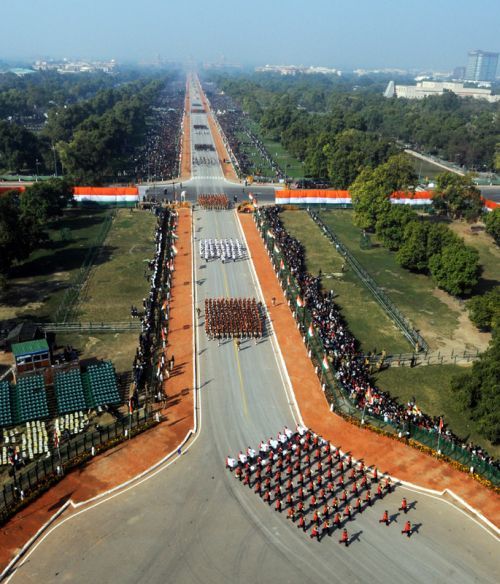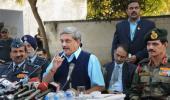 'The Gita was propounded on a battlefield and regards the use of force to establish Dharma or righteousness, as not only legitimate but one's highest duty,' says Colonel Anil A Athale (retd).
'The Gita was propounded on a battlefield and regards the use of force to establish Dharma or righteousness, as not only legitimate but one's highest duty,' says Colonel Anil A Athale (retd).
With a new broom (no pun intended) wielding Manohar Parrikar, a technocrat by inclination, the hardy perennial of 'defence reforms' is again in the news. The current fashion seems to be 'cutting the teeth to tail ratio.' We have had a similar exercise done in the early 1970s under the late General K V Krishna Rao. Then there was the Arun Singh Committee in the late 1980s and the Kargil Report after the 1999 war. Let us also not forget the Henderson Brooks inquiry report.
Essentially the Indian approach to defence/security reforms is episodic and narrow focussed. This is more a band aid approach rather than a holistic diagnosis and treatment. Some basic understanding as to why we Indians are 'like that only' is necessary.
Writing on security issues is a thankless job in India. If one points at the emerging threats, one is labelled a 'scare monger.' Traditionally Indians have woken up to the threat of advancing armies only when they reached Panipat -- a stone throw from Delhi -- but never when they crossed the Khyber Pass.
It is only in India that one is called a war monger if one merely says that till some countries in the world keep the threat of nuclear weapons alive, India must not close its options. In this, one is not referring to the honourable men (and women) with 'pens for hire' but well meaning citizens.
As a symptom of this malaise it is a national shame that there is no national level memorial where the names of more than 15,000 soldiers who gave their lives in defending our freedom, can be found engraved.
What we have instead is an apology at India Gate, hastily constructed in 1972. Lest we forget, India Gate is already a war memorial dedicated to the memory of those who gave their lives in the First World War.
Many explanations, with logic of their own, are offered to explain the situation. The blame for Indian 'pacifism' is put on Mahatma Gandhi. But as the Mahatma himself quite candidly put in his autobiography, 'I have not invented non-violence. It is as old as the hills.'
Veteran Gandhian and industrialist, the late Navalmal Firodia, argued with me that Indians do not value the freedom as we got our freedom relatively 'cheap.' Going even deeper, India's geography that isolates us from the Asian landmass gave us a false sense of security for over a thousand years and therefore most Indians do tend to take it for granted.
Indian civilisation and culture that was nurtured in these geographic settings developed an approach that regards the use of force as Apat Dharma. Thus, the use of force is reserved only for Apat-kal or calamity, and is strictly an Apawad or an exception.
This was most vividly seen in times of crisis.
While researching and writing the history of the 1962 Sino-Indian conflict for the ministry of defence, the mass upsurge that this war saw was truly remarkable.
It was again seen in 1965 and 1971 and the brief Kargil conflict. Indians indeed rise to the occasion. But no sooner the danger has passed, we wiped it from our collective memory.
The major preoccupation of the Brahminical order has been to control the Kshtriyas. Even in Indian fairy tales, the Senapati (chief of the army) is most frequently the villain, who usurps the fair princess and the kingdom.
This is indeed surprising if one is to remember that the Bhagawad Gita, widely accepted as the essence of philosophical moorings of Indians (not Hindus alone, as at that time the other modern religions were not yet born). The Gita was propounded on a battlefield and regards the use of force to establish Dharma or righteousness, as not only legitimate but one's highest duty.
Somewhere along the way and definitely after the rise of Rajputs, war became either a sport or was fought for the sake of individual honour. Bhishma Niti as opposed to Krishna Niti became the dominant creed.
Even the methods of fighting became an issue and Krishna Niti was forgotten. In most languages, Krishna Krutya (Krishna's deeds) became synonymous with dark deeds. Means became as important as ends.
As opposed to this, the Judaic-Christian civilisation follows the doctrine of necessity. The Gandhian counter to the Biblical dictum 'an eye for an eye and tooth for a tooth' was that we may then end up with a world that is full of only the blind and the toothless, is only partially correct. If the whole world is to adopt the Indian approach, it would lead to peace.
But a poser to this is that should only India adopt the peace and non-violence, it is only India that will end up both blind and toothless. The Mahatma was very clear on this issue. His non-violence was to be practised 'only from a position of strength.' Unfortunately his followers failed to grasp this very crucial point of Gandhian philosophy.
The fact is, in less than two-and-a-half months after getting Independence, on October 27, 1947 to be precise, the armed forces of newly independent India had to battle the tribal invasion of Kashmir. In less than 15 years, in December 1961, the non-violent 'satyagraha' approach failed in face of the obdurate Portuguese and India had to send in its army to liberate the last colonial pocket of Goa.
Our peaceful disposition and lack of territorial ambition did not stop the Chinese from attacking us in 1962. Pakistan, even after losing half its country, still nurses dreams of annexing Kashmir and in wilder imagination even thinks of unfurling its flag on the Red Fort in Delhi.
Indians ought to ponder over why and how we lost our freedom in the first place. What were the 'real' compulsions that led to the British withdrawal from India? And finally must we not value the people who defend our freedom?
We owe it to posterity to find a truthful answer to these questions and clear the ideological fog that seems to have settled over the thinking faculties of Indian intellectuals.
The essence of Indianess is the acceptance of plurality, of thought, creed, race and behaviour. This has been wrongly construed as the celebrated 'Indian tolerance.' Nothing could be further from the truth.
Indians are as violent as any other people. But to preserve our plurality and the essence of Indian civilisation, it is necessary to fight creeds that propagate a single path and are intolerant of plurality.
These ideologies could be religious fundamentalists (saffron or green) or economic dogma or hegemonistic nations intent on imposing their way of life.
Running away from this essential duty is not tolerance, it is cowardice.
Colonel Anil A Athale (retd) is a military historian.












 © 2025
© 2025